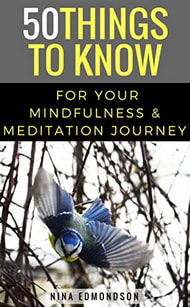What is Meditation?
There are many forms of meditation stemming from differing traditions; most forms use one of two 'strategies'.
Focused Attention
1) You focus your mind like the lens of a camera onto an 'object' such as the breath or body sensations.
You can focus your senses to imagine and induce positive states of well-being.
You can focus on developing qualities such as loving kindness and gratitude.
When thoughts come up, you don't follow the line of thought - like a fish to a worm - getting wrapped up in their stories, but let them go 'like clouds drifting across the sky'.
Then you simply re-connect to whatever you were focusing on before you got distracted.
Open Monitoring
2) You don't focus your mind on an object. The camera lens is zoomed out and your grasp on thoughts relaxed. You rest in stillness and observe the thoughts that arise without reacting in habitual ways. Without getting sucked into the 'story'.
You practice being The Witness
The witness is one who watches from an objective point of view without getting personally involved.
Let's say a thought comes up about a disagreement you had. Usually your mind attaches all of your usual patterns of thinking to it. You may feel anger and re-live the situation, going over the details, remembering who said what to whom, justifying yourself, closing yourself off to the person that angered you. Basically only seeing things from your usual point of view.
Instead, while meditating, when a thought comes up, you simply watch it, notice your reaction and practice letting your judgements go without getting involved. This opens the door to becoming more balanced— it decreases patterns of negative automatic reaction and enables you to view a situation from a variety of angles.
You get more insight into your patterns of thinking and behaving— and those of others. You develop empathy and compassion. You have the insight to change, become more content, loving and to grow in wisdom.
You can also use this method to release physical pain or emotions you're experiencing.
Let's say a thought comes up about a disagreement you had. Usually your mind attaches all of your usual patterns of thinking to it. You may feel anger and re-live the situation, going over the details, remembering who said what to whom, justifying yourself, closing yourself off to the person that angered you. Basically only seeing things from your usual point of view.
Instead, while meditating, when a thought comes up, you simply watch it, notice your reaction and practice letting your judgements go without getting involved. This opens the door to becoming more balanced— it decreases patterns of negative automatic reaction and enables you to view a situation from a variety of angles.
You get more insight into your patterns of thinking and behaving— and those of others. You develop empathy and compassion. You have the insight to change, become more content, loving and to grow in wisdom.
You can also use this method to release physical pain or emotions you're experiencing.
You are a human being - not a human doing
Deeper States of Awareness
With a little practice Open Monitoring leads naturally to deeper states of awareness. Your mind no longer needs an object of focus or other techniques. Some advanced forms of meditation like Zen teach this method from the beginning. I believe however that any form of meditation can lead to this state.
With a little practice Open Monitoring leads naturally to deeper states of awareness. Your mind no longer needs an object of focus or other techniques. Some advanced forms of meditation like Zen teach this method from the beginning. I believe however that any form of meditation can lead to this state.
With more expanded awareness comes a sense of spaciousness, freedom & clarity;
an understanding of interconnected existence - beyond the limited, separate self (the egoic-state)
This is a state of being rather than doing. The practitioner melts into the experience. Thoughts become less judgemental or reactionary (less filtered by our personal perception) - and more - true representations of input.
Negative labels fall away. The mind transcends limited fearful thinking - and opens to empathy, appreciation, forgiveness, connection, intimacy and love - to yourself - to others - to the world around you.
Negative labels fall away. The mind transcends limited fearful thinking - and opens to empathy, appreciation, forgiveness, connection, intimacy and love - to yourself - to others - to the world around you.
The conscious mind's ability to direct attention and awareness has incredible potential.
 Available in Paperback, Kindle & Audio
Available in Paperback, Kindle & Audio
Have a peek in my book - 50 Things to Know for your Mindfulness & Meditation Journey
Many practical guidelines & much insight gained from 15 years of personal practice.
